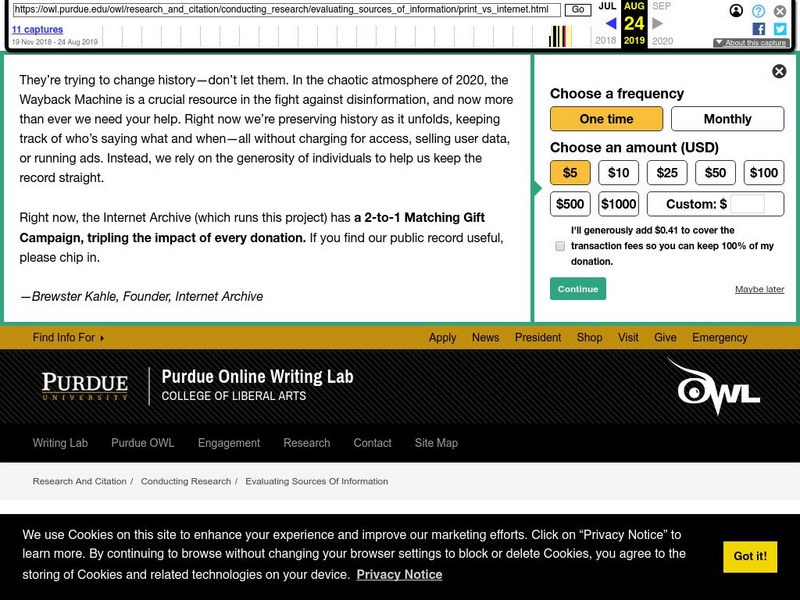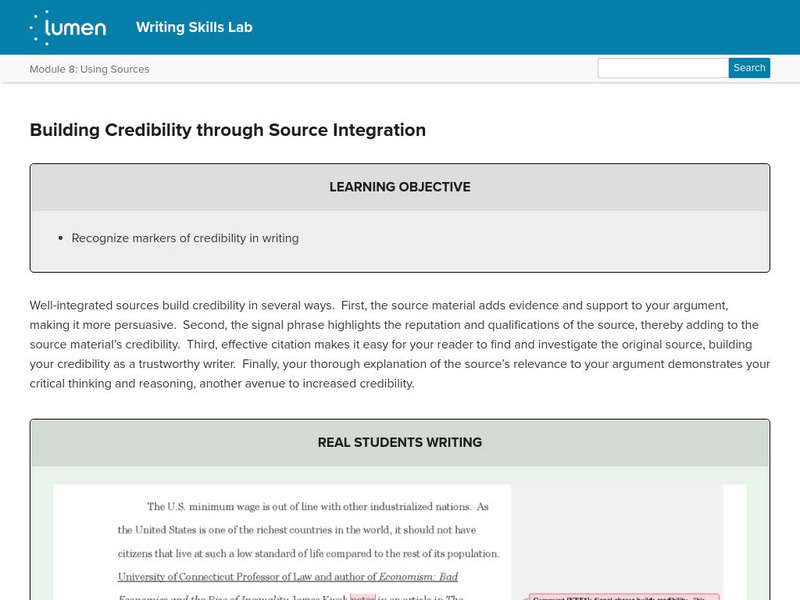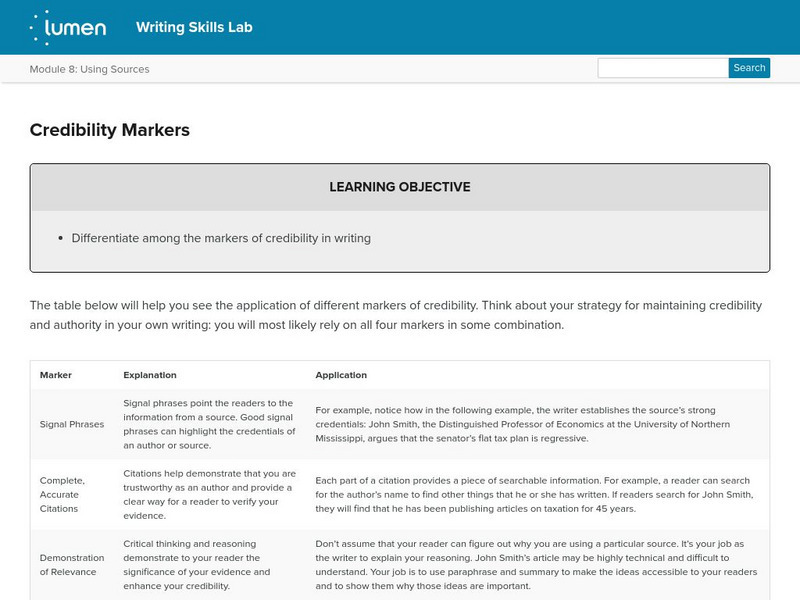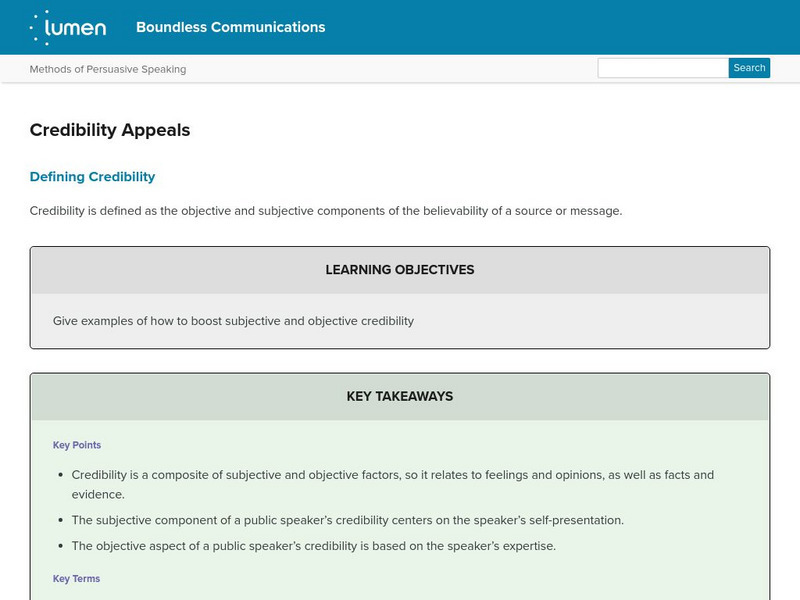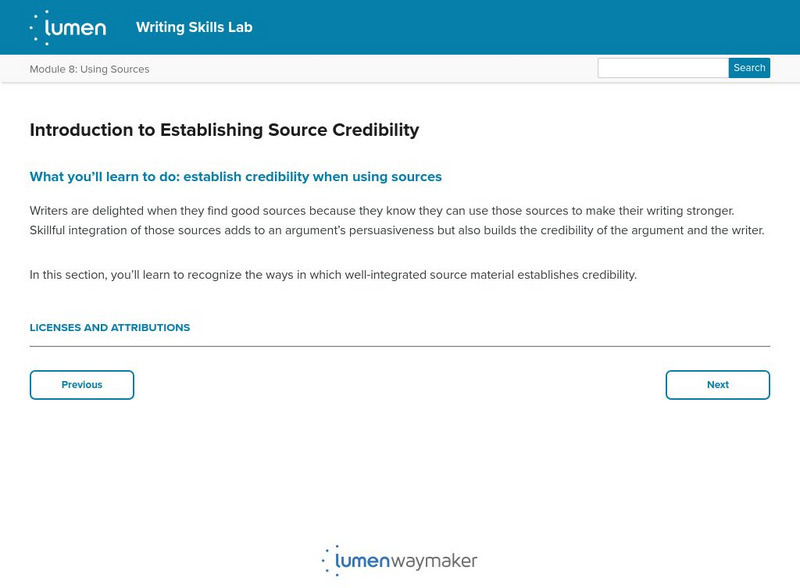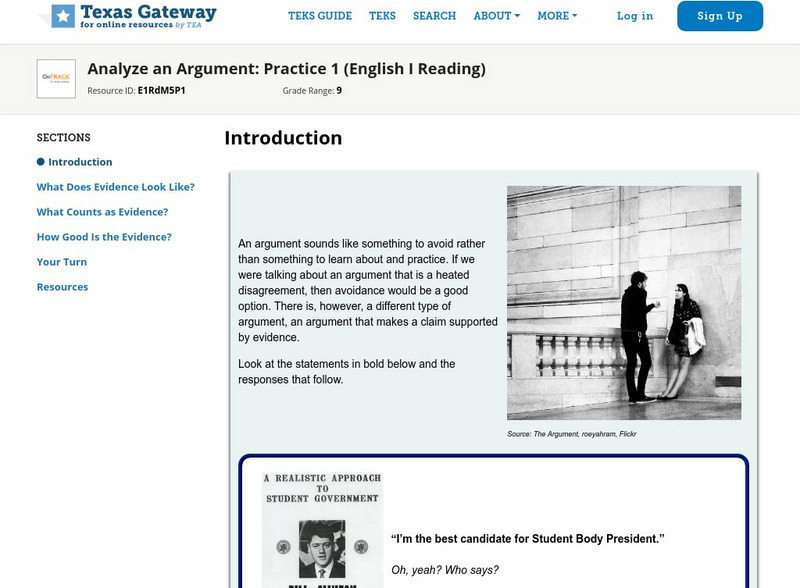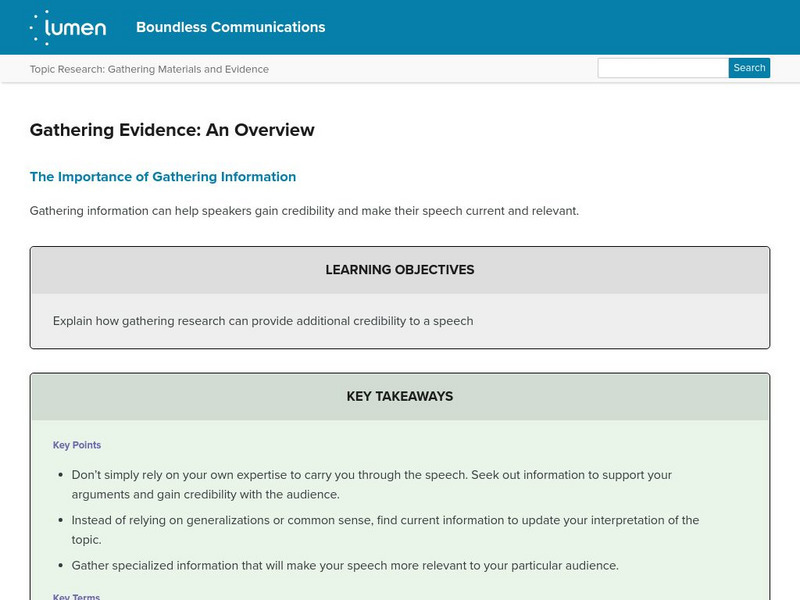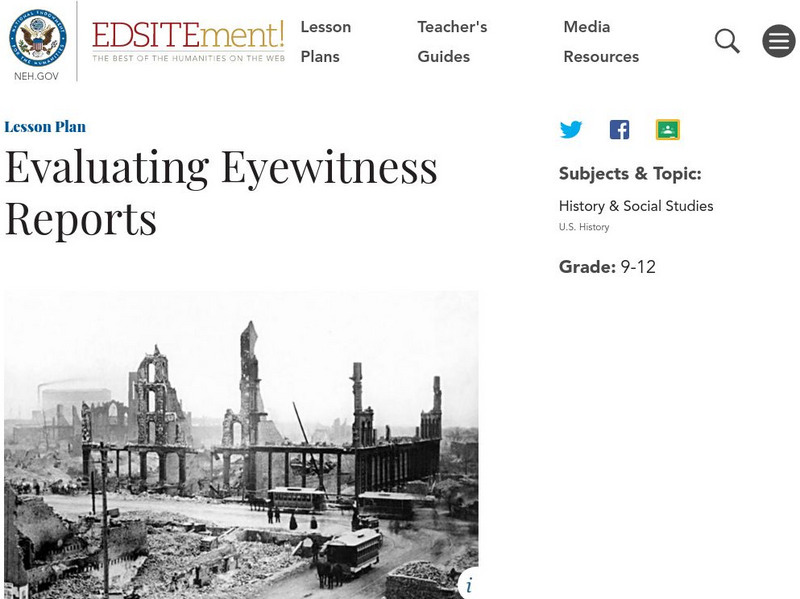Hi, what do you want to do?
Online Writing Lab at Purdue University
Purdue University Owl: Evaluating Print vs. Internet Sources
Learn to look at different text features to determine whether a print or electronic source might be more effective. SL.9-10.2 eval & integrate sources
Lumen Learning
Lumen: Rhetorical Appeals: Establishing Ethos
This lesson focuses on establishing ethos or credibility. You can establish ethos-or credibility-in two basic ways: you can use or build your own credibility on a topic, or you can use credible sources, which, in turn, builds your...
Lumen Learning
Lumen: Using Sources: Building Credibility Through Source Integration
This lesson focuses on building credibility by properly integrating source materials. It discusses three ways of improving credibility through integration, provides an example, and a practice exercise. SL.9-10.2 eval & integrate...
Lumen Learning
Lumen: Using Sources: Credibility Markers
This lesson focuses on strategies for maintaining credibility and authority in your writing. It also provides a table of different types of credibility markers, an explanation, and the application for each. SL.9-10.2 eval & integrate...
Lumen Learning
Lumen: Boundless Communications: Credibility Appeals
In this Boundless Communication, students will learn about the importance of credibility in public speaking. There are four sections: defining credibility, types and elements of credibility, building credibility, and ethical usage....
Lumen Learning
Lumen: Boundless Communications: Credibility Appeals
This lesson focuses on using credible appeals in persuasive speeches including defining subjective and objective credibility, the types and elements of credibility, and the ethical use of credibility appeals. CCSS.ELA-Literacy.CCRA.W.8
Other
Classroom Tech: Evaluating Web Credibility
There is a vast amount of information on the internet, but how much of it is credible? This site presents tips on how to verify the information on a website and not be fooled by web "spoofs". Refer to the checklist for evaluating sources.
Lumen Learning
Lumen: Using Sources: Introduction to Establishing Source Credibility
This is an introduction to establishing credibility by using appropriate integration of source material. Click on the Next button at the bottom right to get to more information about how to establish credibility through integration....
Other
Santa Rosa Library: How to Evaluate Information Resources
Tips and information about how to evaluate resources, both print and electronic. Includes information about source authority, purpose, objectivity, currency, completeness, and relevance. It includes a printable handout (top right)with...
Sophia Learning
Sophia: Critiquing a Source
This lesson goes over how to critique a research source for reliability. W.11-12.8 Sources/Integrate/Cite
The Write Place
Literacy Education Online: Assessing the Credibility of Online Sources
This site from the St. Cloud State University provides information on online sources. This article explains how to assess the value of online sources based on authorship, publisher, date of publication, depth of material, and...
CNN
Cnn: Newspaper Won't Identify Sources in Bombing
Remember Richard Jewell? He was the man accused of being the Olympic bomber by anonymous sources. Jewell was cleared and sued the paper for libel. Links to related stories allows viewers to follow Jewell's story.
Cornell University
Cornell University: Library: Critically Analyzing Information Sources
A quick guide to help you determine the relevance and authority of a resource.
Other
Babson College: Evaluating Quality on the Net
Internet research is a fine writing tool, but can you trust the information you find? This presentation by Hope N. Tillman, Director of Libraries at Babson College, gives advice on assessing the quality and credibility of information...
Georgia Department of Education
Ga Virtual Learning: Web Site Evaluation Rubric [Pdf]
This is a two-page PDF of a rubric to use in the evaluation of websites in the quest for credible websites for research purposes. RI.11-12.7 Eval Different Media/format
University of California
Uc Berkeley Library: Critical Evaluation of Resources
Questions to ask yourself when determining if a source is reliable. Discusses difference between primary and secondary source. List of reference sources and links to other sites that teach you how to evaluate sources....
Texas Education Agency
Texas Gateway: Analyze an Argument: Practice 1 (English I Reading)
In this lesson, students practice analyzing the evidence that supports or opposes an argument. They are also going to learn to analyze the quality, relevance, and credibility of the evidence so you can decide whether to accept the...
PBS
Pbs Learning Media: News and Media Literacy
This collection, which includes videos, blog articles, student handouts, lesson plans, and tip sheets for families, helps students identify, analyze, and investigate the news and information they get from online sources. Media literacy...
Other
Ryerson University: Library: Research Help Guide: Evaluate Your Sources
Resources to help students evaluate the materials they use in their research.
Other
Who Is Hosting This: How to Evaluate Web Resources
This is an excellent, compact guide to evaluating resources on the Internet. It breaks everything down into easy steps and tells you how to do each. Included is an infographic called 'Evaluating Web Resources: A 60 Second Guide.' It also...
Better Lesson
Better Lesson: Avoiding Plagiarism and Citing Sources
In this scaffolded lesson, students engage in practice with determining whether or not research has been plagiarized. A short video demonstration is included. [03:44] This lesson addresses all three College and Career Readiness Standards...
Lumen Learning
Lumen: Boundless Communications: Gathering Evidence: An Overview
This lesson focuses on the importance of gathering information that provides evidence for your topic that is credible, current, and relevant. It also discusses how to find and evaluate sources. SL.9-10.1a Prepared/Discuss
National Endowment for the Humanities
Neh: Edsit Ement: Evaluating Eyewitness Reports
In this lesson, students practice working with primary documents by comparing accounts of the Chicago Fire and testing the credibility of a Civil War diary.
Other
Central Michigan University: Website Research: Fake News
Critical appraisal tests like CRAAP and RADAR can also be used to evaluate the credibility of news websites and the stories they produce (which often go viral on social media). Here are some more resources to help you check! (CRAAP...
Other popular searches
- Source Credibility
- Internet Source Credibility
- Article Source Credibility
- Evaluating Source Credibility





